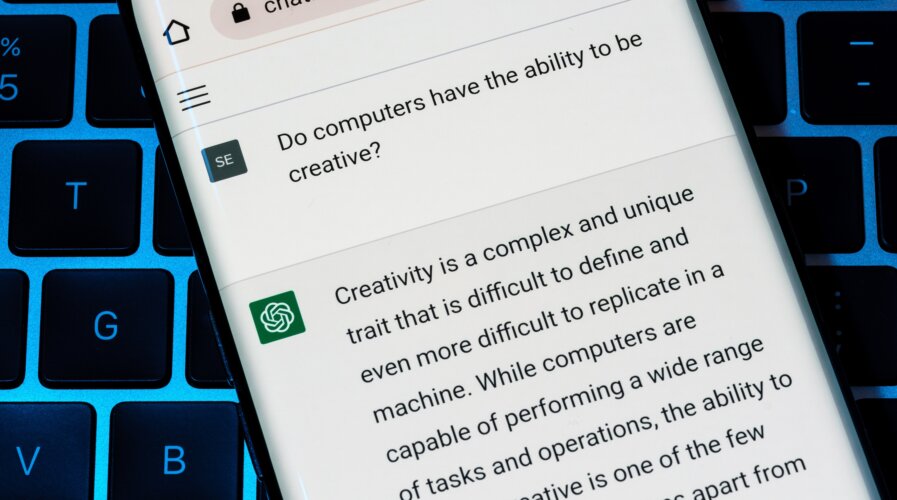
Do you think ChatGPT is a form of plagiarism? (Source – Shutterstock)
Content creation: Is ChatGPT guilty of plagiarism?
|
Getting your Trinity Audio player ready... |
- Questions around plagiarism arise with ChatGPT due to its text generation capabilities.
- ChatGPT generates text based on learned patterns.
The transformative power of artificial intelligence (AI) is undeniable, manifesting its prowess across a broad range of industries, from healthcare and finance to education and entertainment. AI language models like OpenAI’s ChatGPT have become prominent due to their potential applications. However, these innovations also present critical inquiries into various areas, including whether output produced by ChatGPT is susceptible to accusations of plagiarism and how copyright law applies to such scenarios.
These AI models, trained on vast quantities of data, including numerous online materials, spark a question: could they inadvertently commit plagiarism? The discussion becomes pivotal at ChatGPT’s learning corpus, a massive collection of information that the AI utilizes to generate human-like text. The internet is a central figure in AI’s learning, making some people question the possibility of unintentional plagiarism. To understand this, a closer look at how ChatGPT functions is essential.
AI does not learn by memorizing the exact texts or documents used in its training. Instead, it detects and assimilates patterns within the data, similar to a child learning a language. These children don’t remember individual books or conversations; they grasp the patterns they’re exposed to. Similarly, ChatGPT is not copying text verbatim from its training data; it generates new text based on patterns it’s learned.
ChatGPT doesn’t have a detailed understanding of the specific documents or sources included in its training set. It cannot access proprietary databases or confidential documents, only processing publicly available information that formed part of its training data. Furthermore, it cannot independently retrieve or access information from the internet post-training.
So, could ChatGPT inadvertently plagiarize content? ChatGPT doesn’t engage in direct plagiarism – copying text verbatim without attribution. It’s designed to generate new, original text based on the learned patterns, not to duplicate parts of its training data. However, a more nuanced issue emerges. If the model produces output on a topic that closely resembles something in its training data – even if it’s not a direct copy – could this be classified as plagiarism?

A Twitter user, @ChelsIsRight, calls ChatGPT old school plagiarism. (Source – Twitter)
This problem forms the heart of ongoing discussions around AI and plagiarism. Given how AI, like ChatGPT, works, it’s conceivable that it might unintentionally generate text that mirrors the style or content of its training data, unbeknownst to users. This complicated issue lacks a simple solution and raises critical questions about how society perceives and defines plagiarism in the context of AI-generated text.
Such a gray area exists because AI models like ChatGPT don’t consciously ‘know’ or ‘intend’ anything – they merely produce output based on their training. This contrasts with human plagiarism, where there is a deliberate act. With AI, the concept of ‘intent’ is irrelevant, prompting reconsideration of what constitutes plagiarism in this emerging context.
Moving forward, the implications of licensing and copyright in AI’s context are undoubtedly complicated. AI, being in its infancy, operates in a murky realm regarding copyright law. Modern laws were not formulated with AI in mind, posing a challenge to their application to this new technology.
While copyright laws may differ across jurisdictions, they typically don’t apply to data used in machine learning processes. However, the final output could potentially violate copyright if it strongly resembles copyrighted material. This subject puzzles legal experts, ethicists, and AI developers alike and will require regulatory updates for proper resolution.
A final concern involves media under restrictive licenses being indexed and utilized by ChatGPT. If this occurs, liability for infringements could present a grave issue. Yet, as previously mentioned, ChatGPT lacks detailed knowledge of the documents in its training set.
OpenAI ensures compliance with applicable laws and licenses in its training data. Thus, the chances of a specific restricted document forming part of the training corpus are minimal. Even if such a document were included, ChatGPT wouldn’t reproduce it verbatim; instead, it would employ the broader patterns it learned to generate unique responses.
Nevertheless, should a claim of infringement arise, it could potentially lead to a complex legal case. The question of liability – whether it falls on OpenAI, the developers, or the AI’s users – is ambiguous and would likely hinge on the situation’s specifics and the jurisdiction’s laws involved.
The situation isn’t always cut-and-dried in the realm of advanced AI language processing models. Modern chatbots, like ChatGPT, have transcended mere text replication, employing Natural Language Processing (NLP) to deliver unique and context-appropriate responses. OpenAI has shown commitment to guarding against AI plagiarism and misuse, exploring ways to “watermark” GPT-generated text to identify its AI origin.
Since then, OpenAI introduced a new tool, the AI Text Classifier, capable of discerning AI-written text. Launched earlier this year, this free tool aids in determining whether a text sample has been AI-generated, which is a significant step toward improving transparency and accountability.
As AI becomes increasingly incorporated into various aspects of society, the collective aim should be to foster an environment that propels innovation and technological progress while respecting and protecting intellectual property rights. The ongoing conversation surrounding ChatGPT and plagiarism is a critical piece of this complex puzzle, warranting careful attention as society navigates this rapidly evolving landscape.
READ MORE
- Safer Automation: How Sophic and Firmus Succeeded in Malaysia with MDEC’s Support
- Privilege granted, not gained: Intelligent authorization for enhanced infrastructure productivity
- Low-Code produces the Proof-of-Possibilities
- New Wearables Enable Staff to Work Faster and Safer
- Experts weigh in on Oracle’s departure from adland


